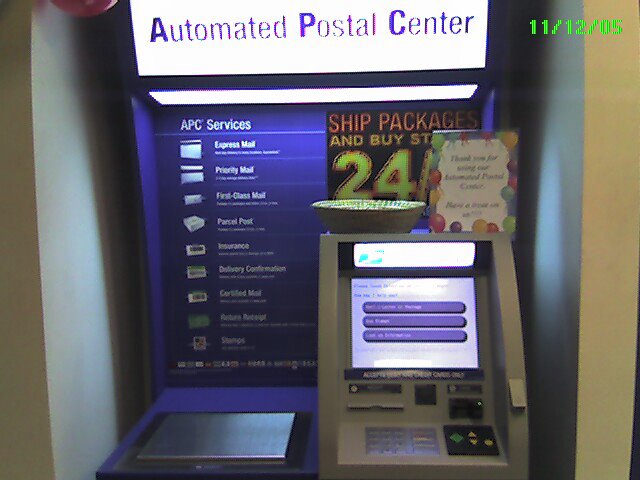
Early adopter that I am, here's my latest favorite tech gadget, courtesy of the United States Postal Service of all things. This is a picture of one of the new Automated Postal Centers that are cropping up around the city. It's basically an electronic kiosk, similar to an ATM, that let's you figure out how much postage is required for packages, buy stamps, and send it off, right from the post office lobby, anytime, day or night.
What's so great about a fancy kiosk? No more waiting in lines! Mail things when you want, not when the post office is open. I took this picture after mailing some domestic and international letters at 8pm tonight. How convenient is that?! No spending your lunch hour in line at the post office or trying to rush there after work. In this age of e-mail and online bill payments, perhaps that's not as much of an issue for some people. But tech maven that I am, I have a thing for fountain pens and still handwrite letters and cards. So the post office still plays a prominent role in my life.
And I seem to have an uncanny ability to get in line behind urban luddites: customers who have seemingly beamed here from 1973 and have never used an ATM touchpad before, or who spend six minutes deciding exactly which type of first class stamps they want, or who get to the front with seven unsealed packages that lack zip codes or return addresses, or who otherwise violate the rules of postal customerdom. It's infuriating for those of us who are accustomed to technology-enhanced, near-instant gratification and who think that everything, postal transactions included, should take approximately 7 seconds. Maybe 9 if it's your first time doing it.
So for those reasons, I'm LOVING the Automated Postal Center. Sure, the Glass Half Empty view is that it's yet another way to take a job or two from a postal worker, but the Glass Half Full view is that it may also free one or two postal workers to do other more labor-intensive tasks, thus speeding things up for other customers overall. Plus, the kiosk likely creates a job for the person who has to service the machine when the inevitable glitches crop up. That's the beauty of technology and the knowledge economy. Some jobs are lost, new ones are created. Sure, it's woe unto the folks who are not ready to operate in this kind of economy, but that's a diatribe for another day.
So look around the next time you're at the post office and you hear someone ask how much 37-cent stamps are. Again. An Automated Postal Center may keep you and your packages on the move.


